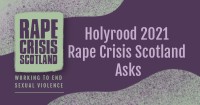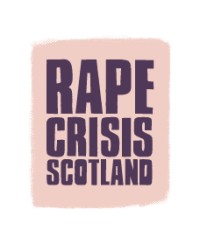News

Holyrood 2021 Asks
Today we are launching our Holyrood 2021 Asks:
a range of important measures to bring real
 and lasting improvements for
survivors of sexual violence in Scotland.
and lasting improvements for
survivors of sexual violence in Scotland.
We urge all politicians to commit to taking these forward so that the kind of
change that is so badly needed can become a reality.
Specialist court recommended for sexual offences
A cross-justice Review Group, chaired by the Lord Justice Clerk, Lady Dorrian, has recommended that a new, national specialist Court with trauma-informed procedures be created to deal with serious sexual offence cases in Scotland.
Sandy Brindley, Chief Executive said: "The conviction rate for rape and attempted rape in Scotland is lower than for any other crime type. This has remained stubbornly the case, despite all previous efforts to address it.
All too often survivors tell us that the process of seeking justice – and in particular their experience in court – is as least as traumatic as the attack(s) itself. It is clear that significant action is needed.
Lady Dorrian’s report is important and necessary. Her recommendations are bold, evidence based, and have the potential to transform Scotland’s response to sexual crime. This is a unique opportunity for Scotland to lead the way internationally in improving access to justice for people who have experienced sexual crime.
Rape Crisis Scotland volunteer information events
Rape Crisis Scotland is looking for women to volunteer on the national helpline supporting survivors of sexual
 violence.
violence.
We are committed to a diverse and inclusive workplace and especially welcome applications from women of colour and women who experience additional barriers to participation.
We will shortly be recruiting helpline volunteers to provide short-term & crisis support to survivors by phone and in writing. Our training will take place online and will run over a combination of weekday evenings and at the weekend.
If you are available to volunteer in the evening, and would like to benefit from the supportive atmosphere, excellent training and personal & professional development that Rape Crisis Scotland offers, come and find out more at one of our information events.
Letter To The Presiding Officer + Linda Fabiani MSP
Ken Macintosh MSP
Presiding Officer of the Scottish Parliament
and
Linda Fabiani MSP
Convenor Committee on the Scottish Government Handling of Harassment Complaints
18/02/2021
I note the decision today by the Scottish Parliament Corporate Body that it is possible to publish Alex Salmond’s submission to the Inquiry.
I write to seek urgent reassurances that Parliament intends to uphold the contempt of court order which is in place to protect the anonymity of complainers from the criminal trial.
We are extremely concerned that this decision is being taken without the legal basis to do so. Lady Dorrian’s slight variation of the order following the Spectator challenge made no difference to the meaning of the order, as I am sure your own legal advice has confirmed.
I cannot stress how important it is that the Parliament fulfils its obligations in respect of not identifying – either directly or in combination with other documents in the public domain – complainers from the criminal trial.
The treatment of the complainers from the trial has been intolerable, particularly online. They have been hounded, identified online and had threats made against them. I am clear that if the Parliament publishes anything which could lead to the identification of any of the complainers you will be directly responsible for putting their safety at risk.
There has been a widespread misinterpretation of the verdict of the criminal trial as meaning that the women made up their allegations. This is inaccurate and dangerous. In reality what the not guilty and not proven verdicts meant – as is the case in all criminal trials – is that the jury did not consider that the Crown had proven the case beyond reasonable doubt.
This is serious and important in itself, but you should also be aware that many women are watching how the Parliament is handling this case, including women who work for the Parliament, and getting a clear message about how they might be treated should they ever consider making a report of sexual harassment, particularly if this report is against someone in a position of power or influence.
The inquiry should have been an opportunity to hold the Scottish Government to account and consider how to improve responses to sexual harassment complaints. There is a grave danger that instead the actions of this Parliament and its politicians are not only endangering women who have already been let down multiple times but making it much harder for women to ever feel able to report sexual harassment in the future.
Yours sincerely,
Sandy Brindley
Chief Executive
Statement on the Committee on the Scottish Government Handling of Harassment Complaints
Below is a statement from the women whose personal and private messages were requested by the Scottish Parliament’s “Salmond Committee” and were handed to the Committee by the Crown Office as part of a Section 23 Order for messages belonging to Sue Ruddick.
In light of the decision taken by the Committee not to publish the messages received from the Crown Office under the Section 23 Order, we feel it is important that our voices are heard, where so far they have been secondary to the Committee’s inquiry.
We are deeply disappointed that the Committee saw fit to request messages between people identified by the Police and the Crown as victims of sexual harassment, some of whose identities are protected by a court order. We have no doubt that members of the Committee knew that vulnerable witnesses were involved when they made the request.
We are also deeply disturbed that the Crown has felt it appropriate to break the trust we placed in it. Having been let down by the Crown Office, we feel this unnecessary act will have done serious damage to progress made over the last few years in sexual assault cases. We urge the Crown to consider the grave consequences of their actions, and are actively considering further options.
Not a single one of these messages relates to the remit of the Committee or the Committee’s published approach to the inquiry. In short, what the Crown provided are personal communications between friends who supported each other during a traumatic time. Comments made by members of the committee, passing judgement on the motivations of women, describing women’s communications as “fair game” and raising questions as to the genuine nature of the complaints made, have caused considerable distress since the Order was placed and do a disservice to all women who have made complaints of this nature.
Each individual in the messages requested by the Committee experienced behaviour from Alex Salmond that was unacceptable and which either Police Scotland or the Crown Office considered potentially criminal.
A group chat, about which there has been much speculation, was simply a support group for women who had already shared their experiences with the Police. The selective quoting of messages by people with whom they should not have been shared has led to increasing pressure on the women involved.
These messages, had they been published, would show clearly that there was no conspiracy between women, but bonds of friendship and support.
There is no manual as to what happens to you when you speak to the Police and they inform you that the actions you describe could be criminal. There’s no handbook that sets out whether or how you’ll be protected, what your rights are and what happens to your identity. There’s no immediate offer of support from a third party, someone who can help guide you through the process. That simply isn’t there. So you turn to your friends and colleagues for support.
And when the person you have been asked by Police Scotland to give evidence about is someone who was and is a hugely powerful figure, there is comfort in knowing that you are not the only one going through that experience, you find support in solidarity.
It is impossible to counter claims of conspiracy by those who selectively choose messages, without any context. These are private and personal communications which should not need to be in the public domain to prove a theory false or for complainers to be believed.
That we work in politics should not prevent us from speaking honestly and truthfully to the Police or to each other, in fact it should compel us to do so, to live up to the values we believe in.
We firmly believe that the Committee’s determination to gain sight of and publish these personal messages is yet another example of the behaviour that led Rape Crisis Scotland to write on behalf of the two complainers in the government investigation into Mr Salmond that;
“They are deeply disappointed that the Committee continues to be insensitive to the fact that they are real people on the other side of this, and they are distressed that their painful personal experiences are being exploited for political purposes through the Committee’s inquiry."
Publication and discussion of private messages is a complete invasion of privacy and has already led to further distress, not only to us, but also to the other women involved in complaints against Mr Salmond, and those we turned to for support.
The bullying and intimidation of complainers through use of their private and personal communications must end now.
Latest posts
- Rape Crisis Scotland chief executive steps down after 24 years
- Our response to Lord’s Advocate’s letter
- We talk a lot about the rise of rape and sexual violence, let’s talk about how to stop it
- Statement: Supreme Court ruling on Daly v HM Advocate; Keir v HM Advocate
- An open letter: Women against the Far Right Scotland